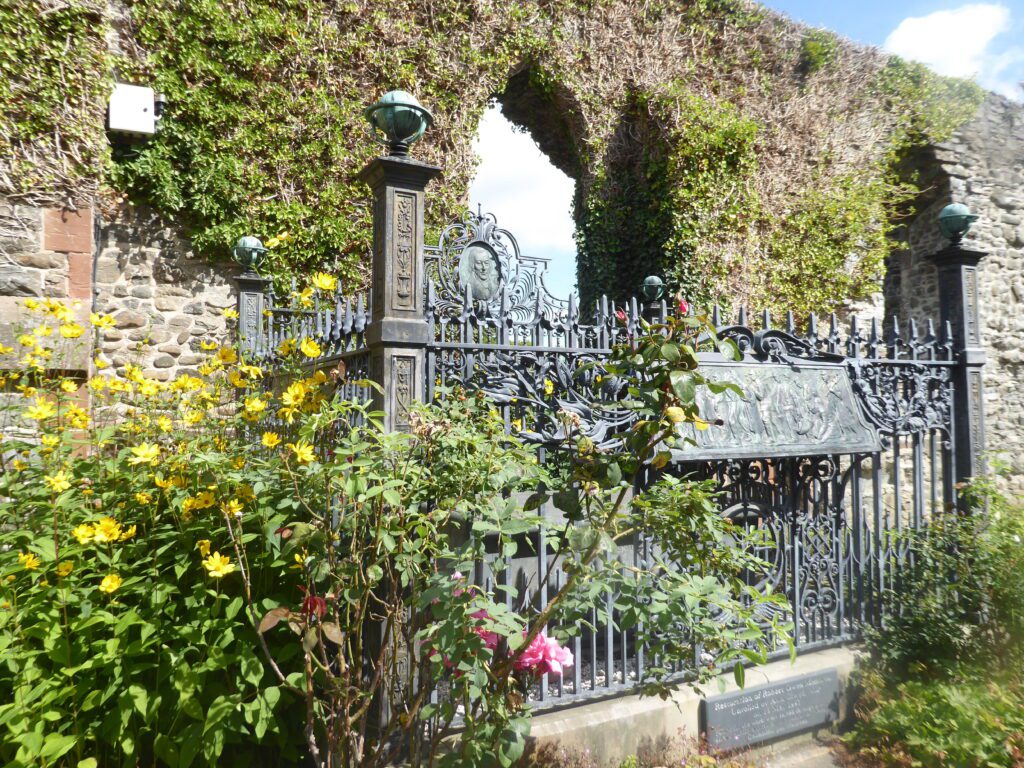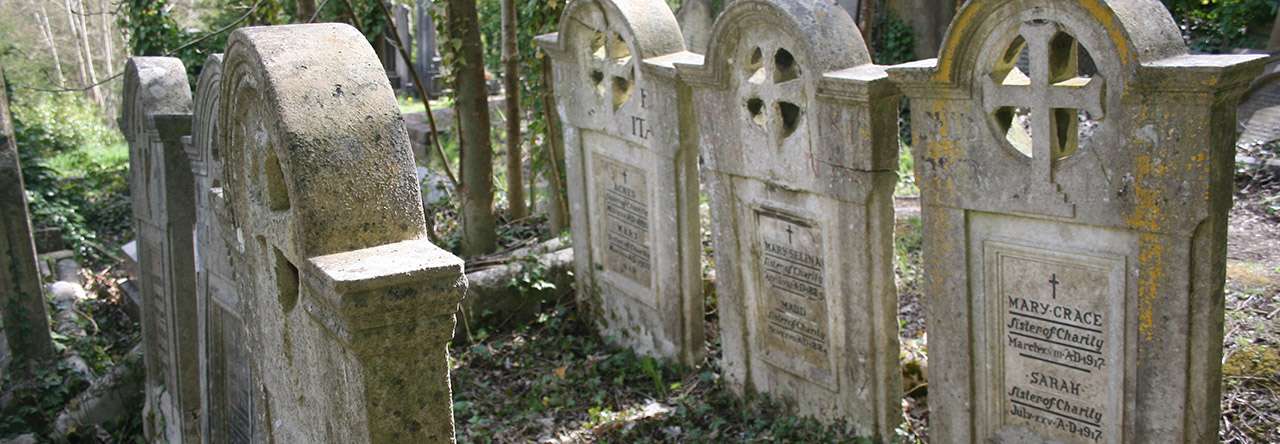1960s planning law led to the expansion of Newtown in Powys, formerly Montgomeryshire, but the heart of the stolid little market town remains huddled in a bend of the river Severn, impervious to the late twentieth century developments which stretch beyond it. The main street is a cheerful jumble of Victorian redbrick and arts and crafts timbers; there are three museums, a contemporary art gallery, and a theatre. And outside the ruined church of St. Mary on the south bank of the river I found a jewel. For there, against a backdrop of ivy-draped stone walls, sat a splendid contrivance of wrought iron swirls and twists, as though an exotic Parisian fantasy from the Belle Epoque had been dropped into the unpretentious Welsh town.
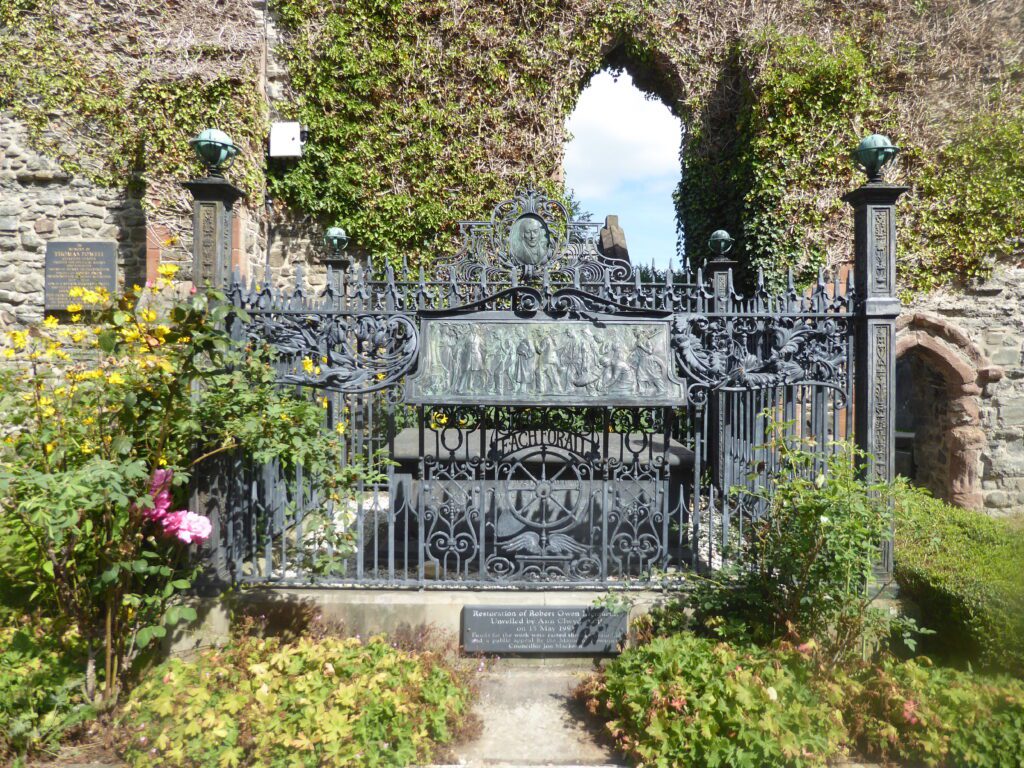
It is the grave of Robert Owen (1771-1858), variously acclaimed as The Father of British Socialism, a Capitalist Paternalist, and the Inspiration of the Co-operative Movement.
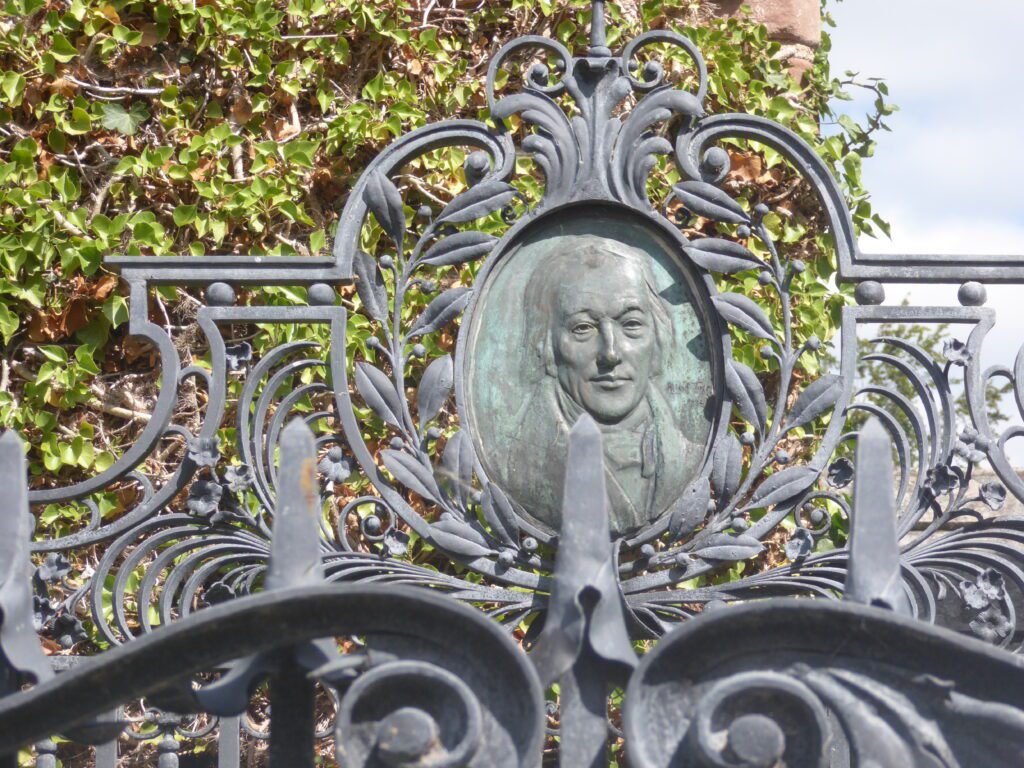
Owen was born in Newtown, leaving school at ten years old to become an apprentice draper in Lincolnshire. After working in London and Manchester he opened and managed his own mill. In 1799 he bought the New Lanark Mill in Scotland. There 2,000 people, five hundred of them children, were employed in cotton spinning.
Conditions in cotton mills were harsh: workers, including children, worked twelve to fourteen hours a day, the machinery was dangerous, discipline brutal, and wages low. Orphans and young children from poor families were often not paid at all, receiving only basic food and a place to sleep. By this exploitation of labour mill owners accrued substantial profits and accumulated great wealth.
Owen’s approach was different. He and his partners, who included Jeremy Bentham, chose to limit themselves to a 5% return on their capital. Owen transformed the factory, introducing the eight-hour day, and campaigning for its introduction elsewhere under the slogan
Eight Hours Labour, Eight Hours Recreation, Eight Hours Rest.
Setting an example in his own mill, Owen campaigned for the introduction of child labour laws, outlawing the employment of children under ten years old. He increased wages, improved working conditions and housing, and reformed the truck system. Under the latter workers had received their pay in tokens which could only be used in the owners’ truck shops where high prices were charged for shoddy goods. Owen did not abolish the system, but his shops sold quality goods at just above wholesale price, passing on savings from bulk purchases. With the profits returned to the community, Owen’s shops were the forerunners of the Co-operative Movement later established by the Rochdale Pioneers.
Espousing the philosophy that character is not inherent, but formed by environment, Owen sought to provide a sound physical, moral, and social background for the children of his workers. At New Lanark he funded schools, including the first nursery schools in Britain for four- to six-year-olds, with a curriculum which included dancing and music.
For Owen’s workers there was the opportunity for adult education, with lectures and concerts. There was recreation on the allotments and free health care.
New Lanark was not perfect: Owen was an autocrat, his workers constantly subjected to his scrutiny, he even inspected their houses for cleanliness; the work was still hard, monotonous, and dangerous; and the Silent Monitor was an alienating presence located above each machinist. The monitor was Owen’s own invention, a four-sided block with each side painted a different colour, it was turned to represent the quality and quantity of the worker’s output.
Nonetheless New Lanark flourished, more efficient than other factories, the output reflected the better working conditions, and it achieved an international reputation. It was a reputation which Owen hoped would appeal to the self-interest of other capitalists, illustrating to them that if they extended the same care to their workers as they did to their machines they might be rewarded with greater productivity.
By the 1820s Owen had embraced the more radical ideals of Utopian Socialism. Moving to the United States, he expended his by now considerable fortune to buy up an existing town of 180 buildings and several thousand acres in Indiana. He renamed the town, previously owned by a religious group which had relocated, New Harmony. In this experimental socialist Utopia, he pursued his belief that a clean, safe environment founded on moral values and equal opportunities would foster mutual respect in a prosperous society. To this end, he poured money into schools and libraries, established communal kitchens and dining rooms, promoted scientific research and the arts.
Yet New Harmony was as spectacular a failure as New Lanark had been a success, and after two years the community was dissolved.
Accounts for the failure vary. There were disagreements within the community and suggestions that some of its members were parasitic upon others, exploiting goodwill to their own selfish advantage. In common with other self-contained communities of the time New Harmony foundered in the absence of members with practical skills. Josiah Warren, the American Philosophical Anarchist who had joined Owen at New Harmony, later rejected Owenism suggesting that self-preservation and the desire for personal property would always prove stronger instincts than commitment to the common good.
Marx, while agreeing that the working class were creating the wealth from which they were not benefitting, did not share Owen’s view that a Socialist utopia within existing society would prove its superiority over time. He reasoned that it was not possible to circumvent international capitalism with small scale communes. The overthrow of the capitalist system could only come via a revolutionary party independent of all capitalist influence.
Owen returned to London with his fortune dissipated, but his beliefs untarnished. No longer wealthy, but increasingly radical, he dedicated the rest of his life to political propaganda in support of trades unionism, the Co-operative Movement, better housing for workers, legislation to improve wages and working conditions, the abolition of child labour, aid for the unemployed, free co-educational schools, the abolition of corporal punishment, equal opportunities, the establishment of libraries and museums, and secularism. He spoke tirelessly at public meetings, churned out pamphlets and periodicals… and died penniless.
Towards the end of his life, he had returned to Newtown seeking to be buried near his parents. There were protests at the prospect of such a dangerous radical and avowedly non-Christian individual being buried in sacred ground. But by good fortune the thirteenth century church of St. Mary, having served five hundred years as the parish church of Newtown, had been abandoned two years previously after repeated flooding when the winter Severn burst its banks. With his congregation relocated to the new St. David’s, the rector proved amenable to Owen’s burial beneath the south wall outside the nave of the old church.
Forty years later Owen’s friend and fellow reformer, George Jacob Holyoake, revisited the grave to find it neglected and decaying. He exerted his influence on the Co-operative Union to restore the tabletop slate tomb and erect the ornate Art Nouveau iron railings, awash with foliage and neo-classical symbols, around it. The tomb bears the Co-op motto
Each for All, and All for Each
and a quotation from Owen himself
It is the one great and universal interest of the human race to be cordially united and to aid each other to the full extent of their capabilities.
At the dedication ceremony in 1902 Holyoake reminded the assembled trade unionists that
Due to Owen – Knowledge is Greater; Life is Longer; Health is Surer; Disease is Limited; Towns are Sweeter; Hours of Labour are Shorter; Men are Stronger; Women are Fairer; Children are Happier.
No mean achievement.
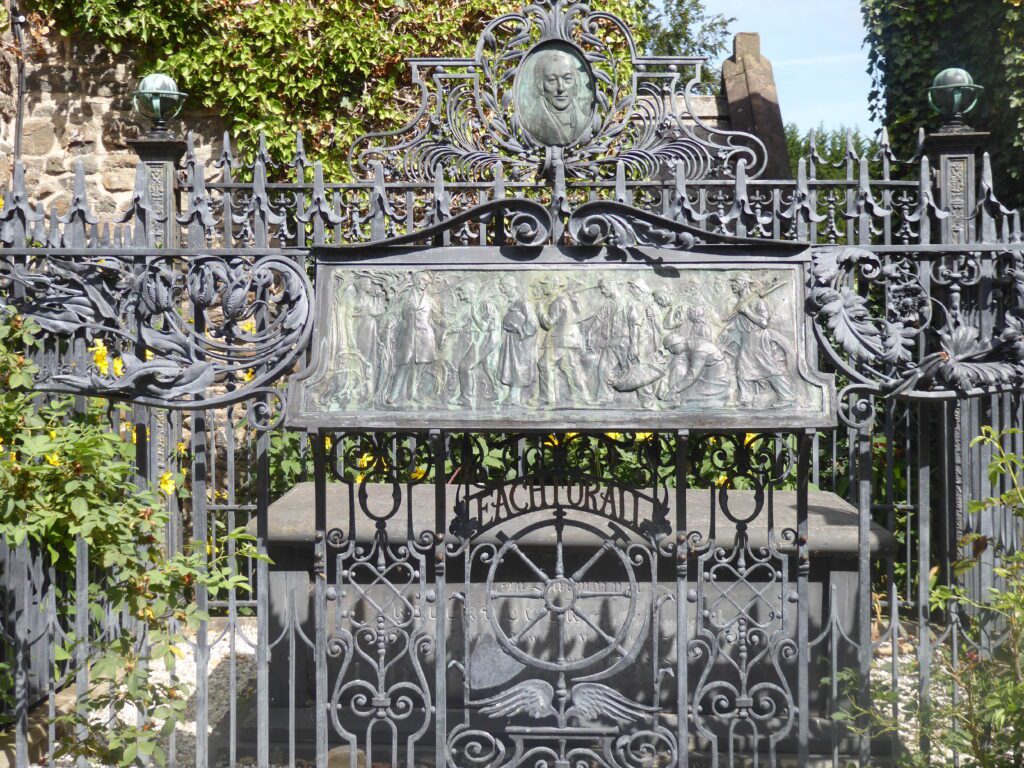
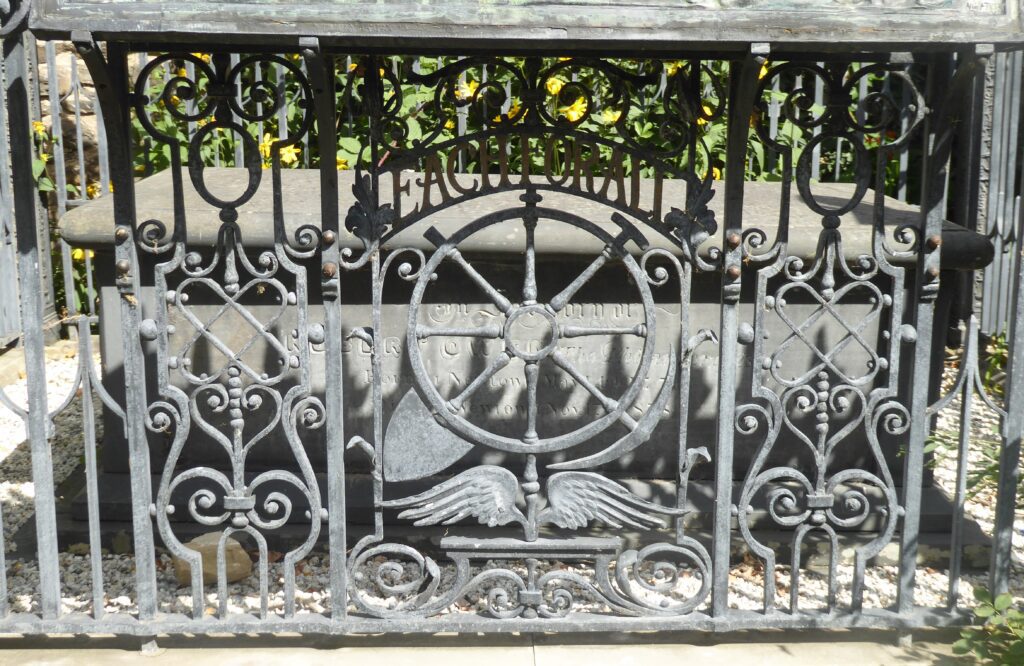
Today a public garden has been created. It runs from the riverbank, through the now roofless church whose walls are lined with old gravestones, surrounds Owen’s tomb, and spills on towards the town in a summer riot of grasses and flowers.
